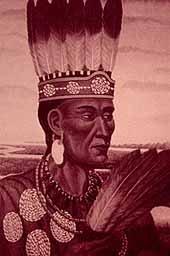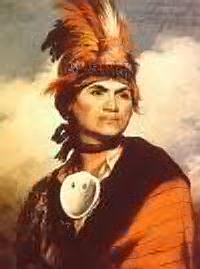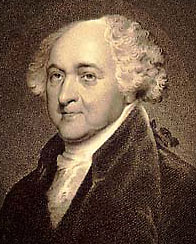



Equal rights vs. "special rights"
Tom Wanamaker explains the difference using a typical court case:
Posted: August 08, 2006
by: Tom Wanamaker / Indian Country Today
The Associated Press reported that Ajax Gaming Ventures, a Trump-owned company, filed a federal lawsuit in Rhode Island on July 21. The suit, to which the town of Johnston is also a plaintiff, alleges that the proposed amendment "violates a provision in the U.S. Constitution requiring state governments to give all people equal protection under the law," the AP said.
Trump's lawyers, AP continued, claim unconstitutionality because casino gaming rights would be given to only one community — West Warwick — and "a single racial group, the Narragansett Indian Tribe, to the exclusion of all others" [Emphasis author's.] Looks like Trump is playing the race card.
Now how ridiculous is this? It is impossible to dispute the fact that the American federal and state governments have rarely offered Native governments and peoples "equal protection under the law." The Cobell v. Kempthorne trust case and the Supreme Court's City of Sherrill v. Oneida Indian Nation of New York decision are but two current examples of how indigenous peoples are still getting less than "equal protection under the law." Yet a billionaire whines that he is being denied equal protection because of being left out of an exclusivity arrangement? Absurd.
Even more egregious is the claim that gaming rights are being awarded to "a single racial group to the exclusion of all others." The Indian Gaming Regulatory Act has nothing to do with race; IGRA simply legitimized the right of recognized tribal governments to conduct gaming on Native land. This right stems from American Indian sovereignty, not racial preference; to suggest otherwise is offensive.
Because Trump has long sought a toehold in the Indian gaming arena, we'd have thought he had already read the text of IGRA. It's high time he did.
"Special rights" debunked
The following stems from a discussion with friend Bill, who, like many Americans, thinks Indians are getting special, race-based treatment in violation of the Constitution—particularly the 14th Amendment.
Bill,
You shouldn't get me started on Indian rights. Oh, too late...you already did it. <g>
The original Constitution is 200+ years old. The portion establishing Indian nations as political bodies is equally old. If you don't like "archaic" legal doctrines, why don't we throw out the whole Constitution and start over? What makes Article I, Sections 1-7 valid but not Article I, Section 8? Shall we throw out all of Section 8, including the portions that permit Congress to tax and borrow, or just the part you don't like?
The courts have rejected the argument that Indians are getting special rights because of their race innumerable times. Why don't you read the decisions and see exactly what the judges have said? If you can punch a hole in the centuries-old doctrine that Indian nations are sovereign entities just like states, by all means do. You'll have achieved a remarkable first and white supremacists will applaud you.
That Indians are getting "special" rights or privileges is one of the stereotypes I've documented in my contest. Like the judges mentioned above, I've analyzed this argument and found it wanting. Forget about challenging the best legal minds in the country. If you can out-debate me on the subject, I'll post your winning arguments for everyone to see.
The debate continues....
The good side of gaming is how it contributes to tribal health and welfare. That's why tribes continue to pursue it. For some reason, they prefer crass commercialism to abject poverty.
If your preference is different, well, nobody's forcing you to visit an Indian casino. And contrary to Schwarzenegger's false innuendo, nobody's going to put one in your neighborhood unless your neighbors approve it. Several people have veto power over off-reservation casinos, including Arnold.
If you prefer a different solution, give them back a few million of the acres we stole. Then they can pursue farming, mineral extraction (oil and gold), or commercial development (housing tracts and mini-malls). The reason we're rich and they're poor is because we have the land and they don't. Give it back and they'll become well-off the usual (non-gaming) American way.
As I said before, most treaties were signed more recently than the Constitution was. The Constitution remains in force, as do centuries-old court rulings like Marbury v. Madison. There's no logical or valid reason for saying some old actions are valid but not others.
If your position is "I don't like those treaties because they don't benefit me," that's about as irrational a reason as there is. If you have a better reason, let's hear it. Why are some old treaties, executive orders, and court decisions valid but not others?
As for the Indians' "dispensations," they were supposed to get enough health, education, and welfare benefits to make them equal to other citizens. That hasn't come close to happening. Indian services are drastically underfunded, as every report on the subject has found. Are you keeping abreast of this well-documented reality?
If you're calling for a doubling or quadrupling of Indian services funding to comply with the still-valid treaties and make up for the lost land, great. I didn't know that was your position. If you think Indians are getting enough now, you're sadly mistaken—unless you think poverty-level "dispensations" are sufficient.
As for how commercially crass the casinos are, have you ever visited one? They usually make some effort to incorporate Native culture in the architecture and decor. They often have galleries of old photographs or small museum exhibits in or near the casino. And they're funding many cultural programs on the reservation that surrounds the casino.
What else do you want? How much more do you expect an Indian casino to do than a commercial casino? Why should they do what you want them to do? They're in business for themselves, not for you or me.
Cities like Temecula build tract homes right up to the edge of reservations like Pechanga. Miles and miles of tract homes are also barren and unappealing. Should the Indians have a veto power over development near them? Why not, since you seem to think Anglos should have some say over development on reservations?
"Special rights" in the Stereotype of the Month contest
Waterman: Tribes get privileges "simply by accident of birth"
Berry: Stop "giving welfare" to Indians; "we conquered them"
Indians forfeited sovereignty when they became US citizens
Other nations were overrun so Senecas don't deserve casinos
County memo claims Mille Lacs reservation no longer exists
Republican: Indians "treated equally" can't own Red Lake
Indians' "special status" is a failure, causes "social pathologies"
"Separate rules and regulations will never be equal or fair"
Indians will use terrorist data to help themselves, not USA
Student editorial: "Canada has done enough for aboriginals"
Bland: Indians can check Census box, then open casinos
Derry: Calif. tribes' "racial monopoly...must be eliminated"
Reservations are "artificial enclaves with special privileges"
Golab: Sovereignty is a concept...that no longer works"
False sovereignty is "real culprit behind Indian problems"
Recognizing Virginia's tribes = "race-based public policy"
Yaffe: Welfare saps aboriginals of will to pursue goals
Lazarus: Casinos break "covenant" against monopolies
US House introduces a bill to ban Indian "preferences"


Is everyone literally equal?
Tons of Americans get benefits solely because of their membership in certain groups. Among them are married people, parents, students, old people, handicapped people, sick people, veterans, homeowners, farmers, and on and on. Do you disapprove of all these beneficiaries? Where exactly does it say in the Constitution that the government literally should treat eveyrone equally, making no accommodations for their age, gender, race, health, income, or marital status? I must've missed that part.
If you get a tax break for being married or having children, will you refuse to take it? Because you're so fired up about how the government unfairly gives some groups benefits over others? I'd like to see that. If you do turn a tax break down, it may be another first for you: the first rejection of a tax break on ideological grounds.
What the 14th Amendment actually guarantees is "the equal protection of the laws," not "equal treatment regardless of age, gender, race," etc. Congress has passed laws and signed treaties (considered "the supreme law of the land") recognizing the special status of Indian nations. As an American citizen, you receive the same treatment as everyone else whom those laws and treaties apply to—i.e., Indians. And you receive the same treatment as everyone else whom they don't apply to—i.e., non-Indians like you.
But you don't receive the same treatment as every American citizen whether you're an Indian or not. That's not what the 14th Amendment guarantees.
Similarly, a law authorizing a draft for citizens aged 18-24 discriminates on the basis of age. But that law would be constitutional under the 14th Amendment. The Amendment merely says that the government can't apply the draft unfairly to people within the 18-24 age range. It doesn't say the government must apply the draft equally to every citizen from age 0 to infinity.
Nations aren't race-based
Once again, Indian tribes aren't getting an accommodation due to race. They existed before the founding of the United States. They're equivalent to foreign countries (i.e., sovereignties) that we incorporated into our nation.
As such, the race of these semi-countries is irrelevant. We'd treat them the same whether their people were red, white, or black. In fact, we do treat them the same whether they're red, white, or black. Tribes can enroll people with only 1/4 or 1/8 Indian "blood"—i.e., people who are predominantly white or black. These people become members in good standing.


Nor is this anything new. Indian tribes have accepted white captives or runaway slaves since the beginning. These "non-Indians" became tribal members and enjoyed the same rights when the tribes signed treaties with the US.
Nothing about that has changed. Tribes have a government-to-government relationship with the US, not a race-to-race relationship. So the only thing that's relevant is their status as semi-countries. That and the constitutional provision granting them their unique status.
If you don't like this situation, start a movement to amend the Constitution. Or vote for a radical Jesse Helms/Clarence Thomas/John Birch Society type who will introduce legislation to overturn almost 200 years of court decisions. These are your only choices.
I hope this discussion has enlightened you on the sovereignty issue. If not, I'll be glad to help you further. Like everyone in this business, we think about it daily, not once in a blue moon.
The debate continues (12/26/04)....
Do treaties signed with the full force of US law and the US Constitution have an expiration date? What would that date be?
We signed an agreement with Britain to cease hostilities and recognize the independence of the United States—the Paris Peace Treaty of 1783. Is that invalid also? Could Britain renew its claim on the American continent?
How about the agreement that ended the Civil War—the Articles of Agreement signed in 1865? Or the Emancipation Proclamation, for that matter? They're around 140 years old. Have they passed the expiration date on lawfully executed orders and agreements?
If you can give me a legitimate criterion whereby a treaty signed with Britain or France in the 1780s is valid but a treaty signed with an Indian nation (as much as a century later) is invalid, please do. I'd like to hear it.
Rob
P.S. For more on why Indian nations are treated uniquely, see The Facts About Tribal Sovereignty.
The ultimate answer to the "special rights" issue
Matt Mattson, Snoqualmie Tribe administrator, said Lindsay tries to "paint tribes as special-interest groups who receive certain exemptions that are somehow unfair.
"The fact is, the U.S. government made deals with tribes hundreds of years ago. If the government doesn't like these deals, then give the land back. These were our peace treaties."
Indian Policy Comes Under Fire, Seattle Times, 12/19/04
Related links
The essential facts about Indians today
|
. . . |

|
All material © copyright its original owners, except where noted.
Original text and pictures © copyright 2007 by Robert Schmidt.
Copyrighted material is posted under the Fair Use provision of the Copyright Act,
which allows copying for nonprofit educational uses including criticism and commentary.
Comments sent to the publisher become the property of Blue Corn Comics
and may be used in other postings without permission.